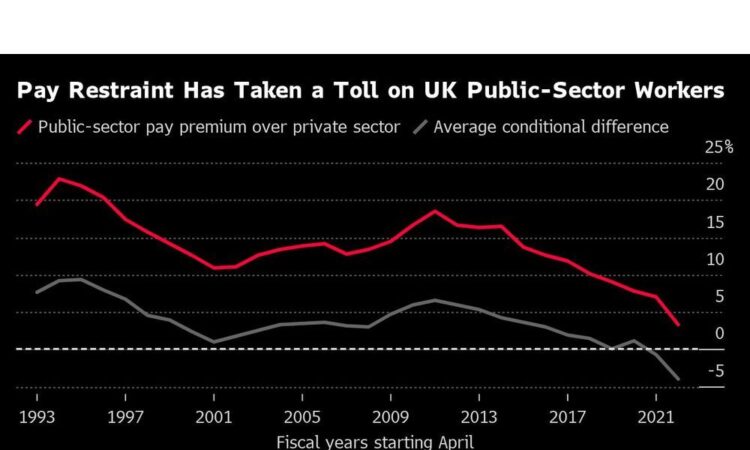
(Bloomberg) — The UK government has been accused of engaging in “distraction” tactics by claiming that raising public-sector pay would add to inflation.
This advertisement has not loaded yet, but your article continues below.
More generous wage agreements for workers such as teachers and nurses, who have been striking for months in protest over below-inflation increases, would do little to push up prices further, economists at the Institute for Fiscal Studies said.
The comments come weeks before Chancellor Jeremy Hunt unveils his budget on March 15. Despite a recent improvement in borrowing, the IFS said the outlook remains weak and “the case for permanent tax cuts or spending increases is no stronger than in the autumn.”
Economists estimate that Hunt will have up to £10 billion ($12 billion) more headroom against his fiscal rules than in November but it would be wiped out by just a small increase in market interest rates. The tight position sharpens the trade-offs facing the chancellor.
This advertisement has not loaded yet, but your article continues below.
Public-sector workers are demanding better pay not only to keep pace with inflation, which is still at 10.1%, but to make up for years of restraint imposed in the wake of the 2008-09 financial crisis.
Last year, average earnings excluding bonuses rose 4.2% in the public sector compared with 7.3% in the private sector, official figures show. Adjusted for inflation, government pay has fallen to levels last seen almost 20 years ago.
The Treasury has argued that high public-sector awards would add to inflation. “In a trivial sense, that is true,” said Ben Zaranko, senior research economist at the IFS.
But injecting more money into the economy by borrowing to fund higher public sector pay would only be inflationary “on the margin.”
This advertisement has not loaded yet, but your article continues below.
Zaranko also attacked government claims last year that an inflation-matching pay rise would cost £28 billion, or £1,000 per household, pointing out that a third would be returned in tax. If public-sector awards rise in line with private sector ones, that would not provoke price pressures, he added.
“I think [the inflation argument] is largely a distraction and the real constraint here is the fact that additional pay awards would have to be accompanied by additional funding, and that might well mean higher taxes,” Zaranko said. “I think it’s the reluctance to do that.”
Paul Johnson, director of the IFS, said Hunt is widely expected to announce a further freeze to fuel duty, costing £6 billion a year, in an attempt to gain popularity among the electorate.
This advertisement has not loaded yet, but your article continues below.
“There’s a straight choice there — £6 billion goes quite a long way if you’re spending that on public-sector pay rather than cutting fuel duties.”
Wages for government workers are typically higher than in the private sector. But once adjusted for the fact that they tend to be older, more experienced and more educated, they are paid 4% less – the lowest level in records going back to 1993.
“I think that we shouldn’t necessarily be using public-sector pay decisions as an inflation or demand management tool,” Zaranko said. “We should be saying, pay to make sure we’ve got the right number of workers with the right skills in the places where we need them to deliver on our desired public-service objectives.”
Borrowing in the first 10 months of the current fiscal year was £31 billion less than the Office for Budget Responsibility forecast in November, thanks to stronger-than-expected tax receipts and less spending on energy support and debt-interest payments.
This advertisement has not loaded yet, but your article continues below.
There are signs of gloom lifting over the economy too. The latest Business Barometer from Lloyds Bank published today showed firms’ optimism about their prospects rising to a 7-month high in February, with almost half expecting stronger trading.
That will fuel confidence that the downturn will be shallower than forecast by the OBR in November. The Bank of England sees a period of stagnation rather than a full-blown recession. Meanwhile, private-sector economists on average expect a short contraction followed by a swift recovery.
In the year starting April, the government deficit is on track to be £25 billion lower than forecast, even assuming another fuel-duty freeze, the IFS said.
Johnson suggested some of this undershoot could be used to smooth out energy bills. Currently the Treasury is due to raise its cap on the average household bill from £2,500 to £3,000 in April, even though energy prices are falling.
This advertisement has not loaded yet, but your article continues below.
Keeping the cap at £2,500 would cost £2.7 billion from April to July and nothing beyond that, based on current forecasts for energy prices, the IFS said.
Yet it will be hard to justify permanent tax cuts or larger departmental budgets when the economy’s growth potential appears to have weakened.
“That case must rest instead on changes to the longer-term outlook,” said the IFS’s senior research economist Isabel Stockton.
Read more:
- Hunt Set for £10 Billion Budget Boost as UK Economy Improves (1)
- UK Says BOE Losses on QT May Mean £200 Billion Hit for Taxpayers
- UK Household Energy Bills to Rise Despite Lower Ofgem Cap (1)
- Labour’s Economic Proposals Must Be Fully-Costed: Reeves (Video)
—With assistance from Philip Aldrick.






